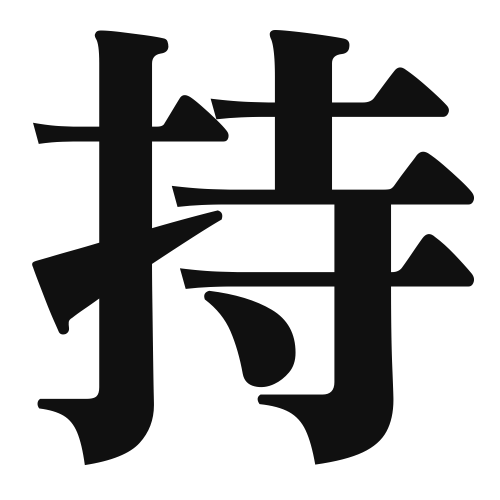1. Overview of Meaning
The kanji “持” (mochi) means “to hold” or “to possess.” It conveys the idea of having something in one’s hands or maintaining control over an object or concept.
2. Formation and Radical
Formation of the Kanji: The kanji “持” is a compound character (会意文字) that combines elements to convey its meaning. It consists of the radical “手” (hand) on the left, indicating an action performed by the hand, and the character “持” on the right, which relates to possession.
Radical: The radical for “持” is “手” (shǒu), which means “hand.” This radical is commonly associated with actions involving the hands.
3. Examples of Usage
Common Words and Phrases: Some frequently used words that include “持” are:
- 持ち物 (もちもの, mochimono) – belongings
- 持続 (じぞく, jizoku) – continuation, sustainability
- 保持 (ほじ, hoji) – retention, maintenance
Example Sentences in Daily Conversation:
- この持ち物は私のです。 (このもちものはわたしのです。) – This belonging is mine.
- 彼はそのアイデアを持続させることができる。 (かれはそのアイデアをじぞくさせることができる。) – He can sustain that idea.
4. Synonyms and Antonyms
Similar Kanji: A similar kanji is “所有” (しょゆう, shoyuu), which means “ownership.” While both “持” and “所有” relate to possession, “持” emphasizes the act of holding, whereas “所有” focuses on the state of owning something.
Opposite Kanji: An antonym for “持” is “失” (しつ, shitsu), which means “to lose.” This kanji represents the opposite action of not having or letting go of something.
5. Cultural and Historical Background
Relation to Japanese Culture: The concept of “持” is significant in Japanese culture, where possession and the act of holding are often associated with responsibility and care. For example, the idea of “持ち寄り” (もちより, mochiyori) refers to bringing items together for a communal purpose, reflecting the importance of sharing and community.
Proverbs and Idioms: One common idiom is “持つべきものは友” (もつべきものはとも, motsubeki mono wa tomo), which translates to “What you should have is a friend.” This emphasizes the value of friendship and support in one’s life.
